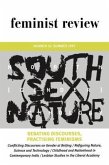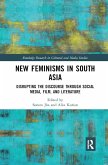- Gebundenes Buch
- Merkliste
- Auf die Merkliste
- Bewerten Bewerten
- Teilen
- Produkt teilen
- Produkterinnerung
- Produkterinnerung
The Handbook of Feminisms in Japan seeks to give a broad and, even without prior knowledge of Japan, easily accessible introduction to a range of feminisms in this non-Western context. With a useful comparative framework, it aims to advance transnational and international perspectives on feminisms around the world.
Andere Kunden interessierten sich auch für
![Feminisms in Social Work Research Feminisms in Social Work Research]() Feminisms in Social Work Research57,99 €
Feminisms in Social Work Research57,99 €![Feminisms in Social Work Research Feminisms in Social Work Research]() Feminisms in Social Work Research199,99 €
Feminisms in Social Work Research199,99 €![Frontline Feminisms Frontline Feminisms]() Jennifer Rycenga / Marguerite Waller (eds.)Frontline Feminisms68,99 €
Jennifer Rycenga / Marguerite Waller (eds.)Frontline Feminisms68,99 €![Indian Feminisms Indian Feminisms]() Geetanjali GangoliIndian Feminisms54,99 €
Geetanjali GangoliIndian Feminisms54,99 €![Debating Discourses, Practising Feminisms Debating Discourses, Practising Feminisms]() Debating Discourses, Practising Feminisms49,99 €
Debating Discourses, Practising Feminisms49,99 €![New Feminisms in South Asian Social Media, Film, and Literature New Feminisms in South Asian Social Media, Film, and Literature]() New Feminisms in South Asian Social Media, Film, and Literature53,99 €
New Feminisms in South Asian Social Media, Film, and Literature53,99 €![Feminisms in Leisure Studies Feminisms in Leisure Studies]() Feminisms in Leisure Studies54,99 €
Feminisms in Leisure Studies54,99 €-
-
-
The Handbook of Feminisms in Japan seeks to give a broad and, even without prior knowledge of Japan, easily accessible introduction to a range of feminisms in this non-Western context. With a useful comparative framework, it aims to advance transnational and international perspectives on feminisms around the world.
Produktdetails
- Produktdetails
- Verlag: Routledge
- Seitenzahl: 364
- Erscheinungstermin: 16. Mai 2025
- Englisch
- Abmessung: 250mm x 175mm x 24mm
- Gewicht: 807g
- ISBN-13: 9789048571611
- ISBN-10: 9048571618
- Artikelnr.: 73970657
- Herstellerkennzeichnung
- Libri GmbH
- Europaallee 1
- 36244 Bad Hersfeld
- gpsr@libri.de
- Verlag: Routledge
- Seitenzahl: 364
- Erscheinungstermin: 16. Mai 2025
- Englisch
- Abmessung: 250mm x 175mm x 24mm
- Gewicht: 807g
- ISBN-13: 9789048571611
- ISBN-10: 9048571618
- Artikelnr.: 73970657
- Herstellerkennzeichnung
- Libri GmbH
- Europaallee 1
- 36244 Bad Hersfeld
- gpsr@libri.de
Andrea Germer is professor of Japanese studies at Heinrich Heine University Düsseldorf. She has published on women's history and movements, gender and animation, visual propaganda and fascism, including the co-edited volumes Gender, Nation and State in Modern Japan (2014), and Gendering Fascism (forthcoming 2025). Ulrike Wöhr teaches gender studies and Japanese studies at Hiroshima City University. Her research has focused on women's history and on feminist movements and thought in modern and contemporary Japan, often applying a transnational framework. She has also published on German colonialist discourse on Japan, from a gender perspective.
Introduction to Feminisms in Japan, Chapter 1 Academia: Gender Studies,
Women's Studies and Feminist Movements, Chapter 2 Anarchism: Feminist
Confrontations with Patriarchy and the State, Chapter 3 Antifeminism: A
Trajectory of Mockery, Denial and Fake Equality, Chapter 4 Art: Feminist
Interventions in Theory and Practice, Chapter 5 Care: From the Gender
Division of Labor to a Feminist Ethics of Care, Chapter 6 Disability:
Feminist Challenges to Eugenics and the Emergence of Disabled Women's
Voices, Chapter 7 Ecology: Feminist Contentions Surrounding Women's Logic
and Women's Complicity, Chapter 8 Education: Feminists Promoting
Educational Change and Resisting the Gender Backlash, Chapter 9 Ethnicity:
Liberation Movements of Korean Women in Japan and the Discovery of
Intersectional Feminism, Chapter 10 The Family and Marriage: Feminist
Interventions in a Society with a Bilateral Kinship Structure, Chapter 11
Futures: Possibilities and Pitfalls for Feminism as an Ongoing Political
Project, Chapter 12 History: Feminist Negotiations of Female Subjecthood
and Cultural Identity, Chapter 13 Housewives: Gendered Identity as a
Feminist Claim on Democratic Community, Chapter 14 Language: Feminist
Challenges to Linguistic Sexism and Heterosexism, Chapter 15 LGBTIQ:
Inclusion and Exclusion within Feminisms, Chapter 16 Liberalism: Liberal
Feminism and Women's Quest for Full Citizenship, Chapter 17 Literary
Criticism: Feminist Theory in Classical Japanese Literary Studies, Chapter
18 Literature: Feminist Bodies of Fiction, Chapter 19 Maternalism:
Transmutations of Motherhood in Feminist Thought and Activism, Chapter 20
Media: Feminist Strategies to Affect Change in Mass Media Advertising,
Chapter 21 Migration: Feminist Perspectives on the Stagnation of The Lost
Thirty Years, Chapter 22 Peace Movements and Anti-Militarism: Feminists
Organizing for Gender Equality and Against War, Chapter 23
Pornography: From Radical Feminist Critique to Organized Victim Support,
Chapter 24 Prostitution and Sex Work: Competing Feminist Perspectives on
Exploitation and Agency, Chapter 25 Protofeminism: Negotiating the Gender
Order of Tokugawa Japan, Chapter 26 Radical Feminisms: Rising Up Within and
Against the Japanese Context, Chapter 27 Religion: Feminist Solidarity
Beyond Denominational and Confessional Boundaries, Chapter 28 Reproduction:
The Feminist Reproductive Rights Movement and the Lingering Shadow of the
Eugenics Protection Act, Chapter 29 Sexual Slavery: Feminist Responses to
Japan's System of Comfort Women, Chapter 30 Sexual Violence: Shifting
Conceptions, with Feminism and Beyond, Chapter 31 Socialism and Marxism:
Feminist Critique of Women's Labor under Capitalism, Chapter 32 The State:
Feminists' Theoretical and Practical Engagement, Chapter 33 Transnational
Movements: Leveraging International Standards and Decolonizing Feminism,
Chapter 34 Uman Ribu: The 1970s Women's Liberation Movement, Chapter 35
Work: Feminist Challenges to the Employment System and the Underlying
Gender Division of Labor, Appendix: Japanese Laws and Policy Plans,
Appendix 2: Exhibitions on Feminist Art and Women Artists, Index
Women's Studies and Feminist Movements, Chapter 2 Anarchism: Feminist
Confrontations with Patriarchy and the State, Chapter 3 Antifeminism: A
Trajectory of Mockery, Denial and Fake Equality, Chapter 4 Art: Feminist
Interventions in Theory and Practice, Chapter 5 Care: From the Gender
Division of Labor to a Feminist Ethics of Care, Chapter 6 Disability:
Feminist Challenges to Eugenics and the Emergence of Disabled Women's
Voices, Chapter 7 Ecology: Feminist Contentions Surrounding Women's Logic
and Women's Complicity, Chapter 8 Education: Feminists Promoting
Educational Change and Resisting the Gender Backlash, Chapter 9 Ethnicity:
Liberation Movements of Korean Women in Japan and the Discovery of
Intersectional Feminism, Chapter 10 The Family and Marriage: Feminist
Interventions in a Society with a Bilateral Kinship Structure, Chapter 11
Futures: Possibilities and Pitfalls for Feminism as an Ongoing Political
Project, Chapter 12 History: Feminist Negotiations of Female Subjecthood
and Cultural Identity, Chapter 13 Housewives: Gendered Identity as a
Feminist Claim on Democratic Community, Chapter 14 Language: Feminist
Challenges to Linguistic Sexism and Heterosexism, Chapter 15 LGBTIQ:
Inclusion and Exclusion within Feminisms, Chapter 16 Liberalism: Liberal
Feminism and Women's Quest for Full Citizenship, Chapter 17 Literary
Criticism: Feminist Theory in Classical Japanese Literary Studies, Chapter
18 Literature: Feminist Bodies of Fiction, Chapter 19 Maternalism:
Transmutations of Motherhood in Feminist Thought and Activism, Chapter 20
Media: Feminist Strategies to Affect Change in Mass Media Advertising,
Chapter 21 Migration: Feminist Perspectives on the Stagnation of The Lost
Thirty Years, Chapter 22 Peace Movements and Anti-Militarism: Feminists
Organizing for Gender Equality and Against War, Chapter 23
Pornography: From Radical Feminist Critique to Organized Victim Support,
Chapter 24 Prostitution and Sex Work: Competing Feminist Perspectives on
Exploitation and Agency, Chapter 25 Protofeminism: Negotiating the Gender
Order of Tokugawa Japan, Chapter 26 Radical Feminisms: Rising Up Within and
Against the Japanese Context, Chapter 27 Religion: Feminist Solidarity
Beyond Denominational and Confessional Boundaries, Chapter 28 Reproduction:
The Feminist Reproductive Rights Movement and the Lingering Shadow of the
Eugenics Protection Act, Chapter 29 Sexual Slavery: Feminist Responses to
Japan's System of Comfort Women, Chapter 30 Sexual Violence: Shifting
Conceptions, with Feminism and Beyond, Chapter 31 Socialism and Marxism:
Feminist Critique of Women's Labor under Capitalism, Chapter 32 The State:
Feminists' Theoretical and Practical Engagement, Chapter 33 Transnational
Movements: Leveraging International Standards and Decolonizing Feminism,
Chapter 34 Uman Ribu: The 1970s Women's Liberation Movement, Chapter 35
Work: Feminist Challenges to the Employment System and the Underlying
Gender Division of Labor, Appendix: Japanese Laws and Policy Plans,
Appendix 2: Exhibitions on Feminist Art and Women Artists, Index
Introduction to Feminisms in Japan, Chapter 1 Academia: Gender Studies,
Women's Studies and Feminist Movements, Chapter 2 Anarchism: Feminist
Confrontations with Patriarchy and the State, Chapter 3 Antifeminism: A
Trajectory of Mockery, Denial and Fake Equality, Chapter 4 Art: Feminist
Interventions in Theory and Practice, Chapter 5 Care: From the Gender
Division of Labor to a Feminist Ethics of Care, Chapter 6 Disability:
Feminist Challenges to Eugenics and the Emergence of Disabled Women's
Voices, Chapter 7 Ecology: Feminist Contentions Surrounding Women's Logic
and Women's Complicity, Chapter 8 Education: Feminists Promoting
Educational Change and Resisting the Gender Backlash, Chapter 9 Ethnicity:
Liberation Movements of Korean Women in Japan and the Discovery of
Intersectional Feminism, Chapter 10 The Family and Marriage: Feminist
Interventions in a Society with a Bilateral Kinship Structure, Chapter 11
Futures: Possibilities and Pitfalls for Feminism as an Ongoing Political
Project, Chapter 12 History: Feminist Negotiations of Female Subjecthood
and Cultural Identity, Chapter 13 Housewives: Gendered Identity as a
Feminist Claim on Democratic Community, Chapter 14 Language: Feminist
Challenges to Linguistic Sexism and Heterosexism, Chapter 15 LGBTIQ:
Inclusion and Exclusion within Feminisms, Chapter 16 Liberalism: Liberal
Feminism and Women's Quest for Full Citizenship, Chapter 17 Literary
Criticism: Feminist Theory in Classical Japanese Literary Studies, Chapter
18 Literature: Feminist Bodies of Fiction, Chapter 19 Maternalism:
Transmutations of Motherhood in Feminist Thought and Activism, Chapter 20
Media: Feminist Strategies to Affect Change in Mass Media Advertising,
Chapter 21 Migration: Feminist Perspectives on the Stagnation of The Lost
Thirty Years, Chapter 22 Peace Movements and Anti-Militarism: Feminists
Organizing for Gender Equality and Against War, Chapter 23
Pornography: From Radical Feminist Critique to Organized Victim Support,
Chapter 24 Prostitution and Sex Work: Competing Feminist Perspectives on
Exploitation and Agency, Chapter 25 Protofeminism: Negotiating the Gender
Order of Tokugawa Japan, Chapter 26 Radical Feminisms: Rising Up Within and
Against the Japanese Context, Chapter 27 Religion: Feminist Solidarity
Beyond Denominational and Confessional Boundaries, Chapter 28 Reproduction:
The Feminist Reproductive Rights Movement and the Lingering Shadow of the
Eugenics Protection Act, Chapter 29 Sexual Slavery: Feminist Responses to
Japan's System of Comfort Women, Chapter 30 Sexual Violence: Shifting
Conceptions, with Feminism and Beyond, Chapter 31 Socialism and Marxism:
Feminist Critique of Women's Labor under Capitalism, Chapter 32 The State:
Feminists' Theoretical and Practical Engagement, Chapter 33 Transnational
Movements: Leveraging International Standards and Decolonizing Feminism,
Chapter 34 Uman Ribu: The 1970s Women's Liberation Movement, Chapter 35
Work: Feminist Challenges to the Employment System and the Underlying
Gender Division of Labor, Appendix: Japanese Laws and Policy Plans,
Appendix 2: Exhibitions on Feminist Art and Women Artists, Index
Women's Studies and Feminist Movements, Chapter 2 Anarchism: Feminist
Confrontations with Patriarchy and the State, Chapter 3 Antifeminism: A
Trajectory of Mockery, Denial and Fake Equality, Chapter 4 Art: Feminist
Interventions in Theory and Practice, Chapter 5 Care: From the Gender
Division of Labor to a Feminist Ethics of Care, Chapter 6 Disability:
Feminist Challenges to Eugenics and the Emergence of Disabled Women's
Voices, Chapter 7 Ecology: Feminist Contentions Surrounding Women's Logic
and Women's Complicity, Chapter 8 Education: Feminists Promoting
Educational Change and Resisting the Gender Backlash, Chapter 9 Ethnicity:
Liberation Movements of Korean Women in Japan and the Discovery of
Intersectional Feminism, Chapter 10 The Family and Marriage: Feminist
Interventions in a Society with a Bilateral Kinship Structure, Chapter 11
Futures: Possibilities and Pitfalls for Feminism as an Ongoing Political
Project, Chapter 12 History: Feminist Negotiations of Female Subjecthood
and Cultural Identity, Chapter 13 Housewives: Gendered Identity as a
Feminist Claim on Democratic Community, Chapter 14 Language: Feminist
Challenges to Linguistic Sexism and Heterosexism, Chapter 15 LGBTIQ:
Inclusion and Exclusion within Feminisms, Chapter 16 Liberalism: Liberal
Feminism and Women's Quest for Full Citizenship, Chapter 17 Literary
Criticism: Feminist Theory in Classical Japanese Literary Studies, Chapter
18 Literature: Feminist Bodies of Fiction, Chapter 19 Maternalism:
Transmutations of Motherhood in Feminist Thought and Activism, Chapter 20
Media: Feminist Strategies to Affect Change in Mass Media Advertising,
Chapter 21 Migration: Feminist Perspectives on the Stagnation of The Lost
Thirty Years, Chapter 22 Peace Movements and Anti-Militarism: Feminists
Organizing for Gender Equality and Against War, Chapter 23
Pornography: From Radical Feminist Critique to Organized Victim Support,
Chapter 24 Prostitution and Sex Work: Competing Feminist Perspectives on
Exploitation and Agency, Chapter 25 Protofeminism: Negotiating the Gender
Order of Tokugawa Japan, Chapter 26 Radical Feminisms: Rising Up Within and
Against the Japanese Context, Chapter 27 Religion: Feminist Solidarity
Beyond Denominational and Confessional Boundaries, Chapter 28 Reproduction:
The Feminist Reproductive Rights Movement and the Lingering Shadow of the
Eugenics Protection Act, Chapter 29 Sexual Slavery: Feminist Responses to
Japan's System of Comfort Women, Chapter 30 Sexual Violence: Shifting
Conceptions, with Feminism and Beyond, Chapter 31 Socialism and Marxism:
Feminist Critique of Women's Labor under Capitalism, Chapter 32 The State:
Feminists' Theoretical and Practical Engagement, Chapter 33 Transnational
Movements: Leveraging International Standards and Decolonizing Feminism,
Chapter 34 Uman Ribu: The 1970s Women's Liberation Movement, Chapter 35
Work: Feminist Challenges to the Employment System and the Underlying
Gender Division of Labor, Appendix: Japanese Laws and Policy Plans,
Appendix 2: Exhibitions on Feminist Art and Women Artists, Index








